IT ONLY SEEMS like yesterday Hyundai launched the Kona small SUV, but it has just come in for a refresh. Also announced, there will now be a Kona N Line variant added to the range.
Hyundai Kona’s new design retains the model’s winning personality. The small SUV’s exterior design is upgraded with various enhancements to make it even more appealing.
At the same time, Hyundai is expanding its small SUV line-up by launching the sporty all-new Kona N Line . This entry point to Hyundai’s high-performance N brand is distinguished by signature fascia, body colour claddings and large rear spoiler as well as N Line specific design accents.
“Interestingly, there’s a happy vibe that I feel is common with many KONA drivers.” said SangYup Lee, Senior Vice President, Head of Hyundai Global Design Centre. “Our design inspiration stems from this positive spirit, and this is a dedication to all the adventurers out there who explore life with a smile.”
Kona N Line: sporty and progressive design
With the latest product enhancement, Kona will be available for the first time as an N Line version, combining fun to drive with a sporty appearance. The Kona N Line stands out through its motorsports-inspired front and rear end, body colour claddings, and diamond-cut wheel design.
Kona N Line’s front is characterised by the dynamic features of the front bumper, harmoniously connected and unified with the body colour treatment of the wheel arch claddings. Instead of the rugged skid plate on the new Kona, the N Line version features a characteristic N-style aerodynamic lip with low-lying corner fins for a road-hugging appearance. Larger, more technical air intake features are further distinguished by a unique mesh design and surface treatment.
On the sides, the body colour claddings and new rocker panels are complemented by the dedicated 18-inch alloy wheel design.
Kona N Line’s rear design reinforces the model’s dynamic image. The rear bumper incorporates a large central aerodynamic diffusor in a contrast colour to the body as well as a one-side double muffler. The bumper fascia is formed with sharply creased corners and N-style fins for better air flow.
The interior is now available with a dedicated N Line colour package in one-tone black with cloth, leather or suede seats. In addition, the distinctive red stitching, metal pedals and N logo on the gear shift and seats all contribute to a sportier look and feel.
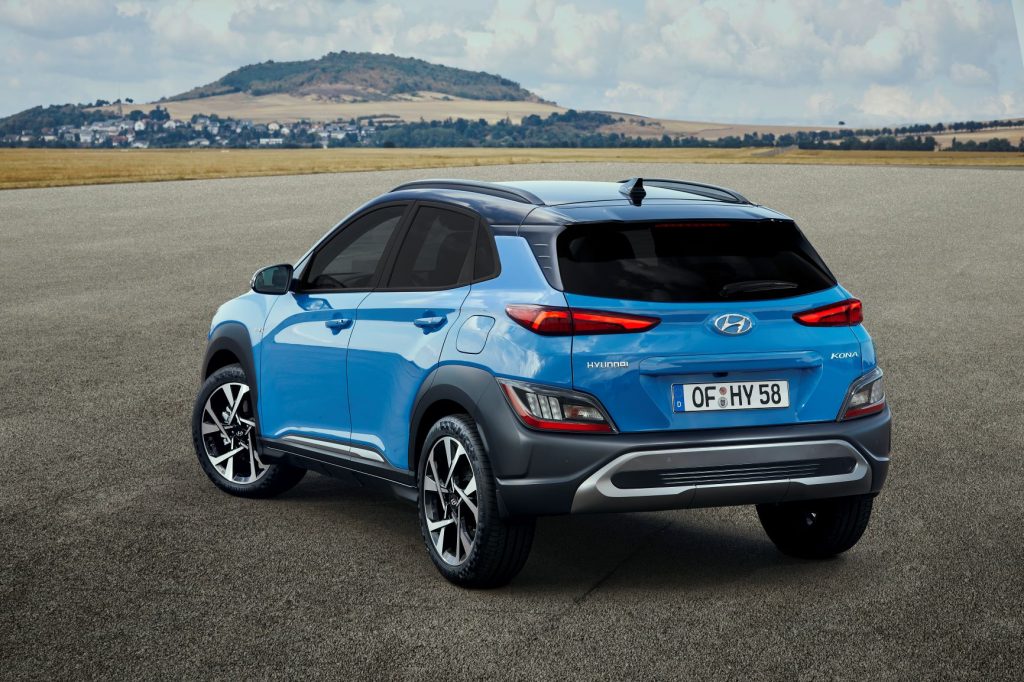
Sleek and sophisticated design upgrades for the new Kona
With a bold, progressive design and adventurous personality, Hyundai Kona has become an icon in its segment.
The striking new front-end design stands out with eye-catching, protective cladding panels. At the top, the stretched bonnet ends sharply over the centre grille with a wide, distinctive shape that gives Kona a powerful look. This effect is further enhanced by the wide, thin LED DRLs. Lower down, the main bumper fascia connects smoothly to the wheel arch claddings, forming a unique and robust armour in a contrasting material to the main body.
On the lower bumper, the robust skid plate appears to embrace the lower air intake, and visually complements the shape of the main upper grille. Integrated into the bumper corners are vertically oriented aerodynamic inlets that improve air flow.
The side body retains the muscular and sculpted shape of the previous Kona, but the sporty wedge-shaped silhouette is further accentuated by the visual connection between the shoulder creases and the sharper, cleaner, more harmonious front end.
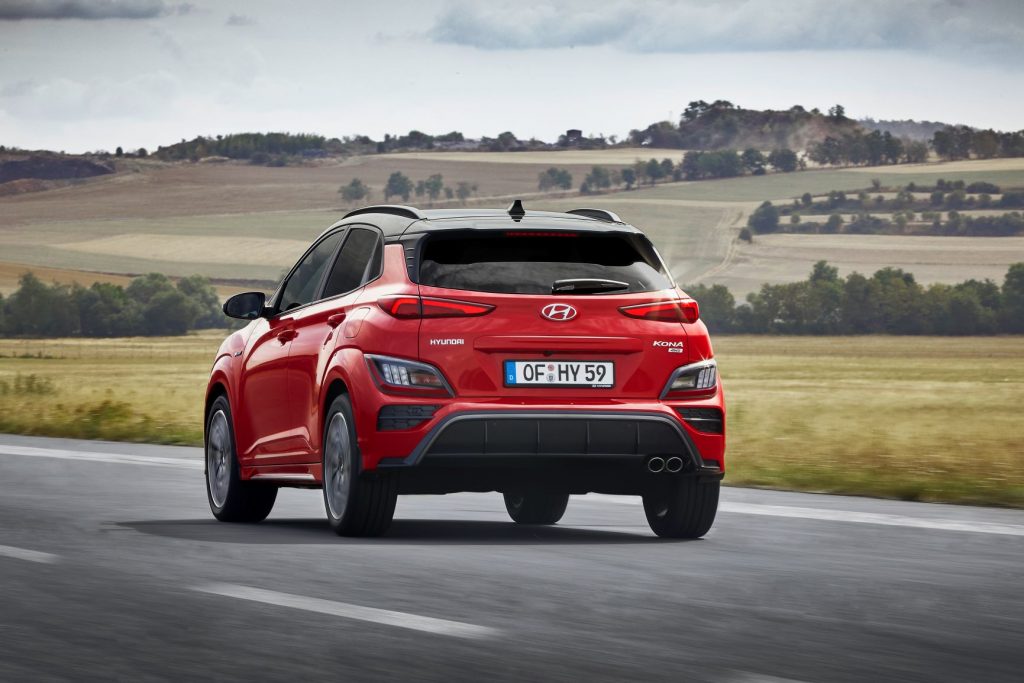
At the rear, the new taillights feature horizontally stretched graphics. The new rear bumper, which also follows the protective armour concept of the front and sides, also uses a contrasting material.
In addition, the latest model comes with updated 17- or 18-inch wheel designs, in addition to 16-inch wheels carried over from its predecessor. Kona Hybrid will be available with the same 16- or 18-inch wheels as before.
The new Kona is 40mm longer than the previous model.
There are five new exterior colours, including Surfy Blue, Dive in Jeju, Ignite Flame, Cyber Grey, and Misty Jungle. These are in addition to five existing colours, including Phantom Black, Chalk White, Dark Knight, Pulse Red and Galactic Grey. Every colour can be combined with the Phantom Black two-tone roof. The two-tone roof also comes with matching mirror housings.
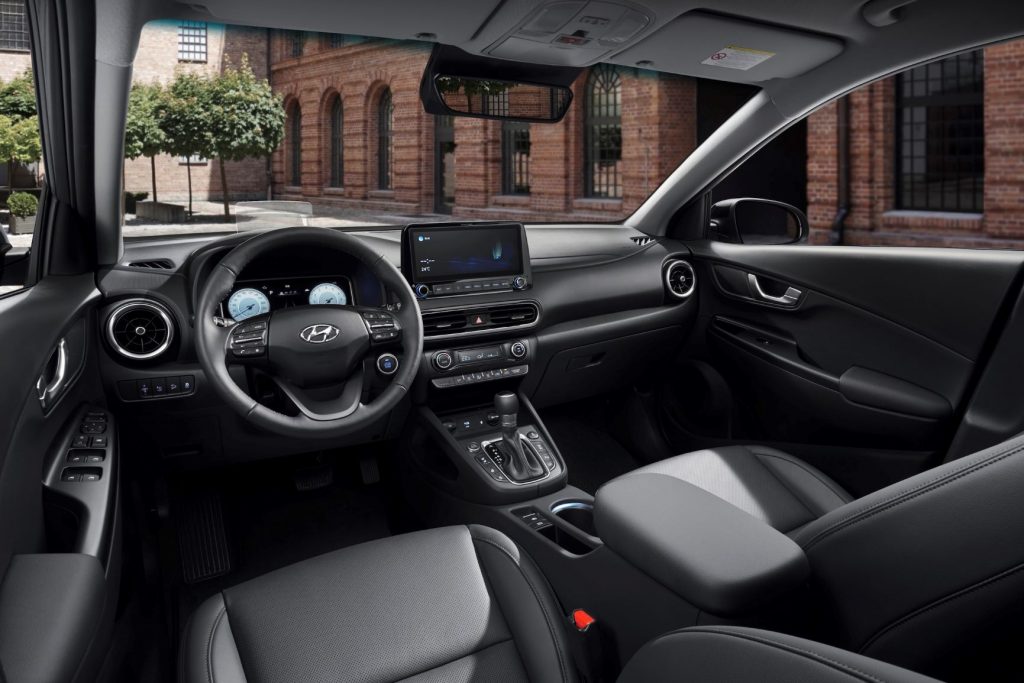
Interior design updates
The redesigned interior of the new features a rugged yet refined style that matches the exterior’s boldness. Extra cargo capacity and rear seat legroom offer more accommodation and comfort. This is in addition to a significant technology upgrade that contributes to the interior’s comprehensive update.
The new console area is disconnected from the instrument panel to emphasise the horizontal layout. The dashboard appears wide and airy to create a generously spacious atmosphere. An electric parking brake is added as a new convenience feature in response to customer demand.
Other enhancements that contribute to the interior’s higher level of quality and refinement include new ambient light technology that illuminates the centre cup holders as well as in the passenger and driver side footwells, and new aluminium finish rings around the speakers and air vents.
New seat cover options include a black woven houndstooth design, cloth seats with black and grey embossing, and perforated leather seats in black, beige, or khaki.
The black woven houndstooth seats and modern grains accentuate the fine-spun linear seat trim with its three-dimensional pattern. With the black and grey cloth seats, sophisticated visuals are created by shadows and dark nuances in several anthracite grey tones. Optional leather seats show a classy tartan texture that is also reflected in the material perforation. Both the texture and the colours of the leather seats harmonise the dynamic-looking interior.
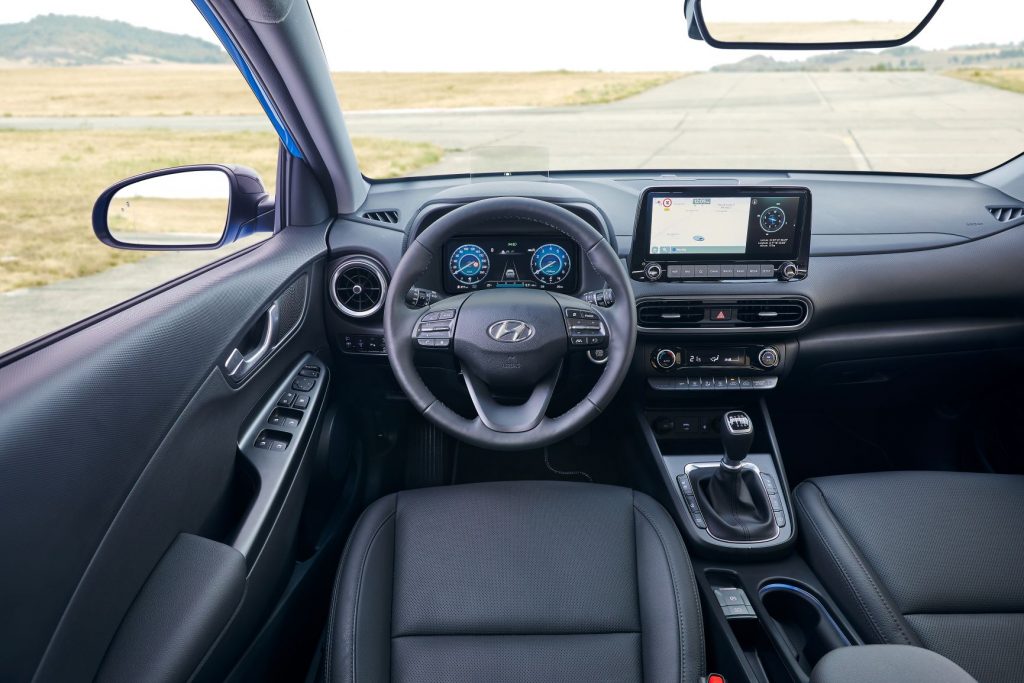
As an alternative to the dark interior, Kona is also available with a light beige interior trim, accentuating the fresh look seen in the door panels and seats. With the optional khaki leather seats and the khaki centre console, Hyundai is also offering a natural and premium look as an alternative to the black and beige versions.
The new Kona’s interior packages include changes in colour to the dashboard as well as the seats and other surfaces.
Colour packages:
- Two-tone light beige leather (new)
- Khaki leather(new)
Basic colour operations:
- One-tone black woven cloth or leather
Connectivity and Technology
New to this model is a 10.25-inch digital cluster, first seen in the all-new i20 (unfortunately, along with other small Hyundais, not coming to Australia). In addition, the new Kona also comes with an optional 10.25-inch AVN screen, providing new connectivity features. The new AVN (audio/video navigation) screen also comes with a split-screen function and multiple Bluetooth connections.
As standard, the new Kona is equipped with Display Audio increased from seven to eight inches, and DAB radio. It’s also upgraded with wireless Android Auto and Apple Car Play for convenient wireless connectivity of their phones to the Display Audio system.
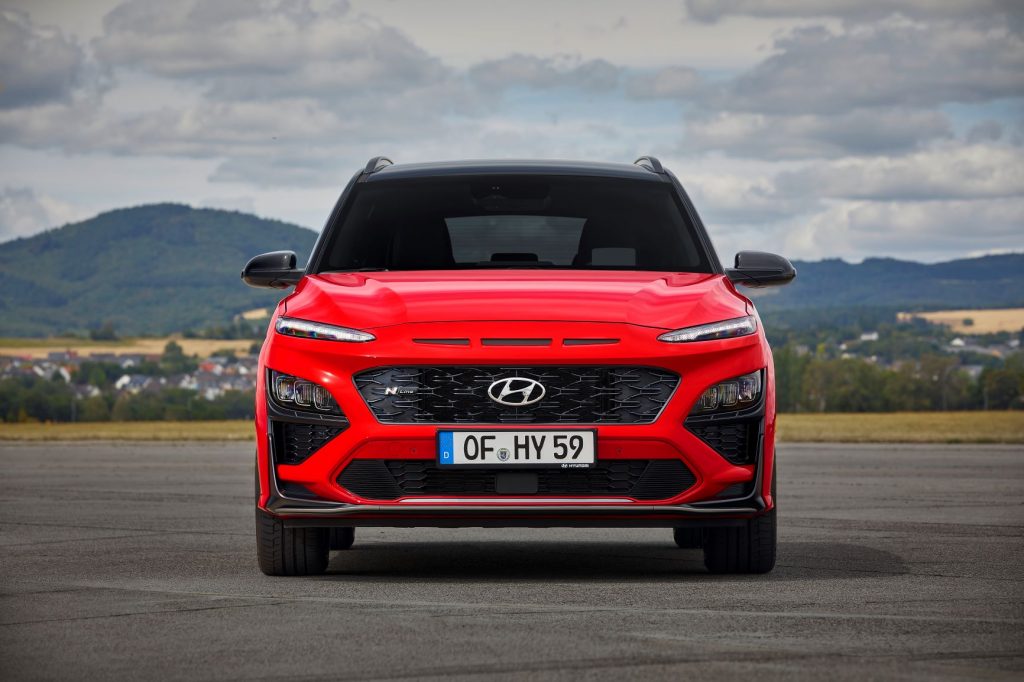
Advanced safety and driver assistance features
Smart Cruise Control (SCC) is upgraded to include the stop-and-go function. Blind-Spot Collision-Avoidance Assist (BCA), available in combination with the DCT, is enhanced too, engaging the vehicle’s differential brakes to prevent a collision if another vehicle is detected near the rear corner (blind spot) and the driver attempts to change lanes.
A first for this model is Leading Vehicle Departure Alert (LVDA), which alerts the driver if they do not react fast enough when the vehicle ahead of them starts moving. Another is Lane Following Assist (LFA), which automatically adjusts steering to assist the driver to keep in the centre of the lane.
Another upgraded feature is Forward Collision-Avoidance Assist (FCA) with pedestrian and new, optional cyclist detection. The optional FCA uses a sensor in addition to a camera to better detect potential collisions. This increases the detection range and types of targets that can be detected, and ensures the system works even in bad weather conditions. If the system senses a potential collision and the driver fails to react in time, it automatically applies the brakes. FCA now comes as standard (camera based), including pedestrian detection.
Rear Cross-Traffic Collision-Avoidance Assist (RCCA), a first for the new Kona with the DCT, works to avoid a collision when backing up by applying the brakes if another vehicle is detected. This is an upgrade from the previously available Rear Cross-Traffic Collision Warning, which only provided a warning.
Another unique feature is Rear Seat Alert (RSA), which alerts the driver if someone or something is in the back seat when they prepare to exit the vehicle. Another safety feature primarily intended for the protection of children, Safe Exit Warning (SEW) is intended to prevent passengers from exiting the vehicle if it is not yet safe to do so. If the vehicle has come to a stop, but the radar detects an oncoming vehicle coming from the rear, it will display a visual and audio warning to alert the passenger of the danger.
Intelligent Speed Limit Warning (ISLW) uses the vehicle’s navigation or the front camera to determine the current speed limit and displays it in the cluster and AVN. If the driver exceeds the speed limit, a visual warning is shown.
The new Kona is now available with eCall, a feature that automatically alerts emergency services if the airbags are deployed or the e-Call button is being pushed.
New Hyundai SmartSense Active Safety Features:
- Blind-Spot Collision-Avoidance Assist (BCA)
- Rear Cross-Traffic Collision-Avoidance Assist
- Smart Cruise Control (SCC) with stop and go
- Leading Vehicle Departure Alert (LVDA)
- Lane Following Assist (LFA)
- Intelligent Speed Limit Warning (ISLW)
- Safe Exit Warning (SEW)
- Rear Seat Alert (RSA) (new)
- Forward Collision-Avoidance Assist (FCA) – now with (new) optional cyclist detection
Other Safety Features:
- e-call (new)
Comfort and Interior Space
Several new convenience features allow for a more comfortable and convenient experience, including second-row heated seats and a second-row USB port. The new Kona with manual seats has also been improved. Passengers in the front row can now adjust their seat height for an optimised seating position while they ride.
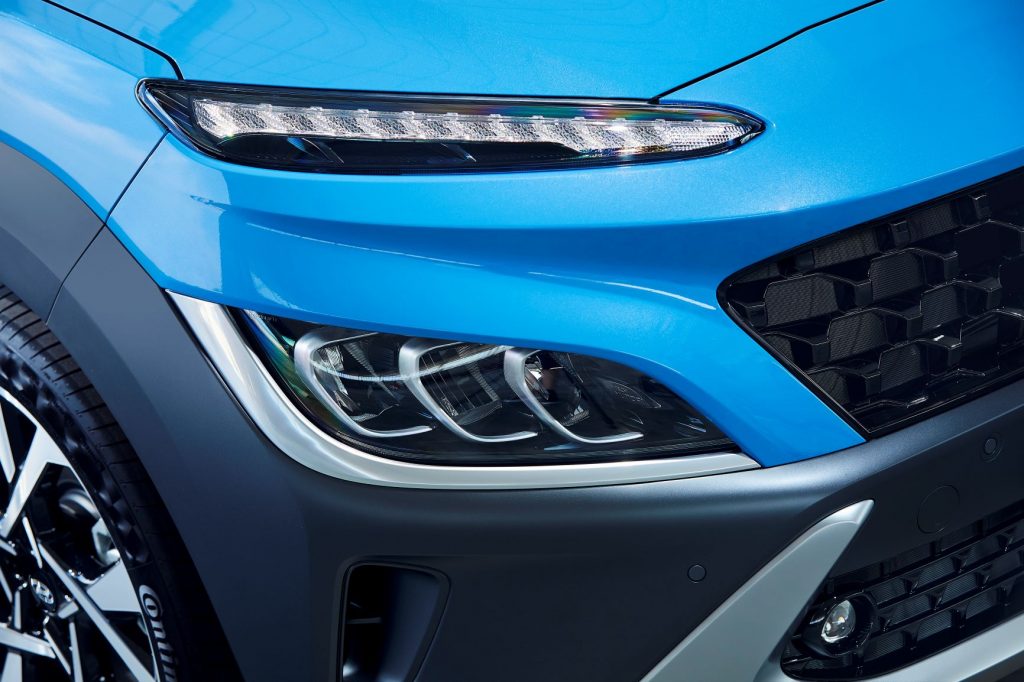
New powertrain options for both sporty and eco-conscious consumers
At the top of the line-up is an enhanced 1.6-litre T-GDI Smartstream engine with a 7-speed dual clutch transmission that delivers 145kW. This powerful, sporty powertrain is available in both two-wheel drive and four-wheel drive variations.
For increased fuel efficiency, the new Kona will be equipped with 48-volt mild hybrid technology. This technology is applied to the 1.6-litre Smartstream diesel engine with 100kW as standard and is available with a seven-speed DCT (7DCT) or six-speed Intelligent Manual Transmission (6iMT) as well as optional four-wheel drive. The 1.0-litre T-GDI Smartstream petrol engine with 88kW can be equipped with 48-volt mild hybrid technology and 6iMT as an option.
First seen in the new i30 and the all-new i20, the iMT’s clutch operates purely electronically instead of using a mechanical linkage. The iMT decouples the engine from the transmission after the driver releases the accelerator, saving fuel as the engine can switch off and the car enters coasting mode. The engine restarts in the same gear as soon as the driver presses either the brake or the accelerator pedals, thanks to the power provided by the Mild Hybrid Starter Generator.
When chosen without mild hybrid technology, the 1.0-litre T-GDI Smartstream engine can be combined with a 7-speed dual clutch transmission or a 6-speed manual transmission and optional four-wheel drive.
KONA Hybrid system
The new Kona is available as a hybrid option, which was added to the Kona line-up in 2019. This powertrain features a 1.6-litre GDI engine and electric motor with a combined output of 103kW, paired with a 6-speed dual clutch transmission and with two-wheel drive. The 32kW electric motor draws its energy from a 1.56 kWh lithium polymer battery.
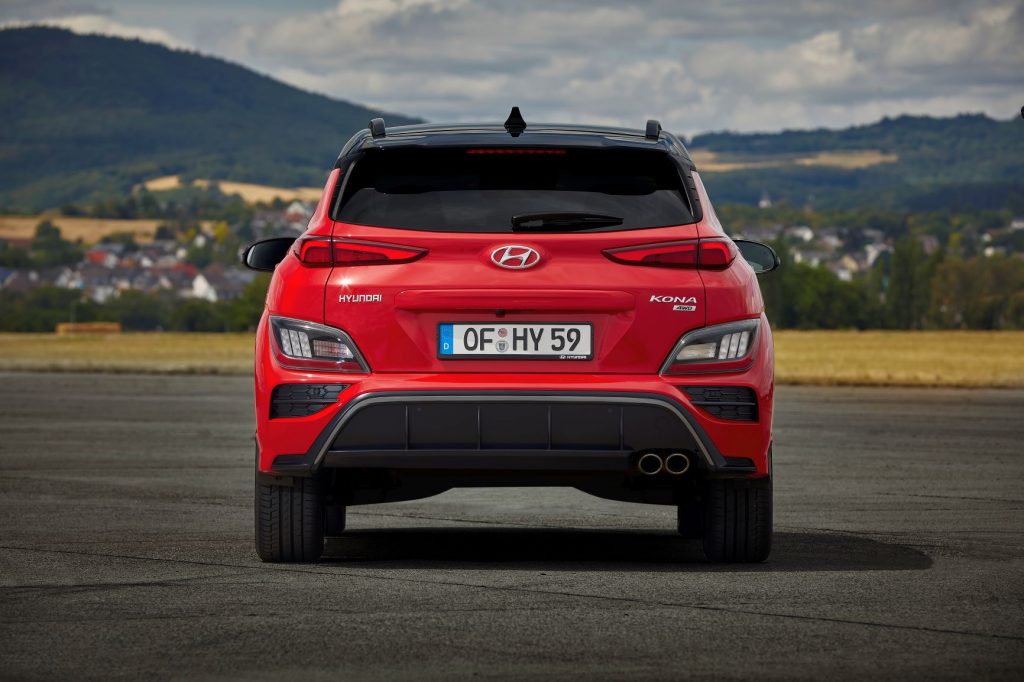
Ride and handling enhancements
The new Kona is retuned for a smoother ride compared to its predecessor in order to improve driving comfort. As well as springs and dampers, the stabiliser bars were modified for better ride comfort and isolation. The rear bump stop was also modified, bringing benefits for primary ride and lateral body control.
The new Kona comes with improved tyres on all sizes of wheels, resulting in less rolling resistance and more efficient driving. The 18-inch tyres are upgraded from Conti Sport Contact 5 to Conti Premium Contact 6 to improve ride comfort. This also means drivers can expect better fuel efficiency and lower CO2 emissions while hearing less road noise than before. In addition, several parts of the vehicle have been updated to improve Noise, Vibration and Harshness (NVH).
The steering is fine-tuned to match the new suspension character as well as to fit the new tyres. The new Kona steering is more linear and well-balanced across the complete speed range.
This set up is applied to the whole Kona range, including the N Line. The only exception is the Kona N Line paired with the 1.6 T-GDI powertrain and four-wheel drive, which received a specific steering tuning to match the character of the vehicle.
Australian Market
Enhanced Kona and Kona N Line will launch locally in the first quarter of 2021. The Australian model line-up and specification will be announced closer to launch.
